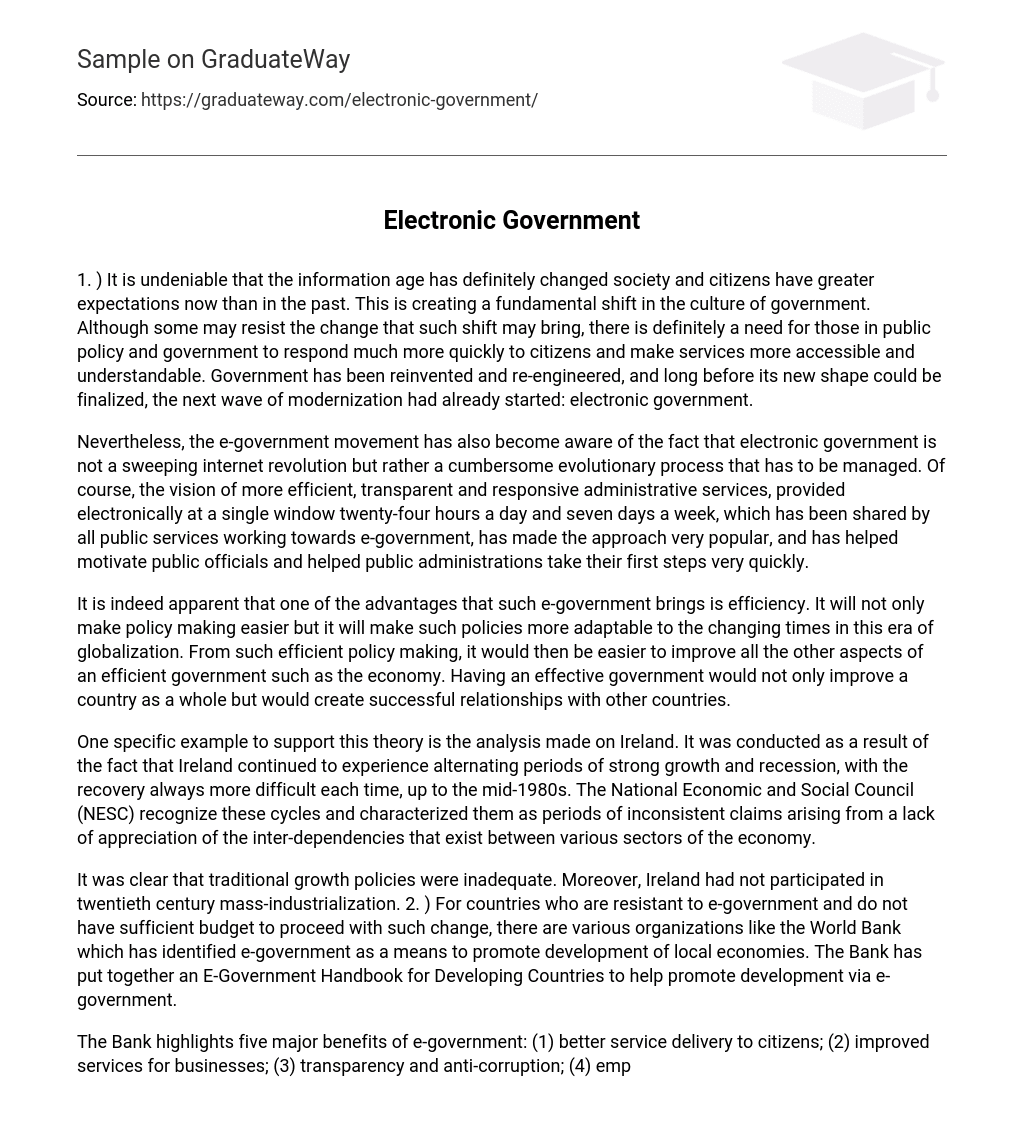It is undeniable that the information age has definitely changed society and citizens have greater expectations now than in the past. This is creating a fundamental shift in the culture of government. Although some may resist the change that such shift may bring, there is definitely a need for those in public policy and government to respond much more quickly to citizens and make services more accessible and understandable. Government has been reinvented and re-engineered, and long before its new shape could be finalized, the next wave of modernization had already started: electronic government.
Nevertheless, the e-government movement has also become aware of the fact that electronic government is not a sweeping internet revolution but rather a cumbersome evolutionary process that has to be managed. Of course, the vision of more efficient, transparent and responsive administrative services, provided electronically at a single window twenty-four hours a day and seven days a week, which has been shared by all public services working towards e-government, has made the approach very popular, and has helped motivate public officials and helped public administrations take their first steps very quickly.
It is indeed apparent that one of the advantages that such e-government brings is efficiency. It will not only make policy making easier but it will make such policies more adaptable to the changing times in this era of globalization. From such efficient policy making, it would then be easier to improve all the other aspects of an efficient government such as the economy. Having an effective government would not only improve a country as a whole but would create successful relationships with other countries.
One specific example to support this theory is the analysis made on Ireland. It was conducted as a result of the fact that Ireland continued to experience alternating periods of strong growth and recession, with the recovery always more difficult each time, up to the mid-1980s. The National Economic and Social Council (NESC) recognize these cycles and characterized them as periods of inconsistent claims arising from a lack of appreciation of the inter-dependencies that exist between various sectors of the economy. It was clear that traditional growth policies were inadequate. Moreover, Ireland had not participated in twentieth century mass-industrialization.
For countries who are resistant to e-government and do not have sufficient budget to proceed with such change, there are various organizations like the World Bank which has identified e-government as a means to promote development of local economies. The Bank has put together an E-Government Handbook for Developing Countries to help promote development via e-government.
The Bank highlights five major benefits of e-government:
- better service delivery to citizens;
- improved services for businesses;
- transparency and anti-corruption;
- empowerment through information;
- efficient government purchasing.
Moreover, there are other organizations such as The Cleveland Free-Net, the worlds first Free-Net and served as a model for hundreds of other free community-oriented networking systems around the world. It was initiated by Tom Grundner at Case Western Reserve University in 1986. Aside from these organizations, a lot of profit oriented groups are very interested in initiating e-government since they know and believe that they are also likely to benefit from it once the ball has started rolling for the said government.
Overall, 60% of government Web site users say such sites had improved their interactions with at least one level of government. While many government site users focus on their personal needs in dealing online with government agencies, there is abundant evidence that a new “e-citizenship” is taking hold as tens of millions use government Web sites to research public policy issues, send comments to public officials about policy choices, gather information to help them decide how to cast their votes, and participate in online lobbying campaigns.
A small questionnaire to survey the attitude of citizens towards government answerable by 1 to 5(1. very willing 2. unwilling 3. neutral 4. willing 5. ery willing) would help in determining the attitude of such e-citizens. The following questions may give an overview on their view regarding e-government.
- Would you be willing to learn about the internet for your country?
- Would you be willing to spend time to learn about e-government?
- Would you be willing to use internet facilities instead of going to the government office? The following are answerable by 1 to 5(1. strongly believe to 5. highly doubtful)
- Do you think sending your comments to the government via email would be effective?
- Do you believe the government will act on your issues faster?
- Do you think government agencies would be easier to contact if they were centralized through e-government?
- Do you think such e-government is here to last?
- Do you think the government will save more money?
- Do you believe this change will improve the country’s economy?
- Do you think government employees will be more effective with this type of set-up?
These questions will help in ascertaining whether or not the citizens are willing to undergo change and if they are, whether they believe that such a change will be beneficial to their government in the long term. It is not enough that they are willing to participate but it is equally important for them to believe that such change will indeed be beneficial.
BIBLIOGRAPHY
- The Greater Cleveland Area, Cleveland Free-Net, retrieved 25 November 2006, < http://ofcn. org/whois/ben/Free-Nets/CFN/Cleveland. html>
- Pew Internet, The Rise of the E-Citizen, retrieved 25 November 2006, < http://www. pewinternet. org/PPF/r/57/report_display. asp>





